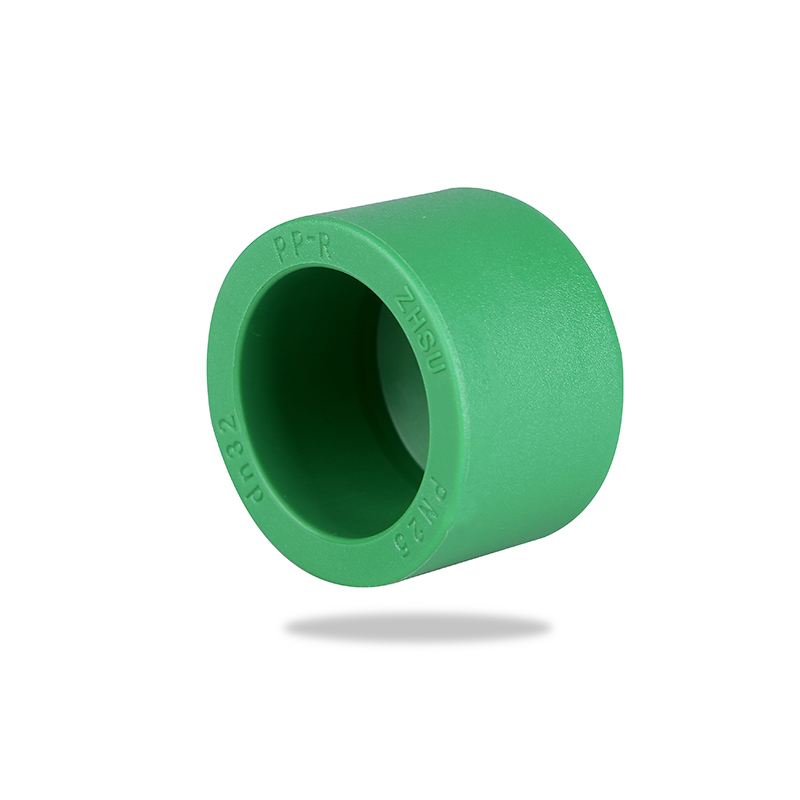PPR Cap (plug in PPR pipe fittings) has excellent performance in pressure resistance, tensile resistance and corrosion resistance, and is particularly suitable for water pipe systems and applications that require long-term pressure bearing and durability. The following is a detailed analysis of the performance of PPR Cap in these three aspects:
Compression performance
High pressure tolerance: The polypropylene (PPR) material used in PPR Cap has good pressure resistance. In standard water supply pipeline systems, PPR pipes and accessories (including PPR Cap) can usually withstand higher pressures, generally 0.8-1.0 MPa (megapascal) water pressure, suitable for common civil water supply, hot water systems and industrial pipelines.
Long-term stability: PPR Cap can maintain its pressure resistance during long-term use, especially in environments with large pressure changes, and can still maintain a long service life. According to ISO 15874, PPR pipes and accessories can withstand water temperatures below 80°C and corresponding pressures without rupture during long-term use.
Improved pressure bearing capacity: With the improvement of the process of PPR materials, the PPR Cap on the market can now meet more engineering applications in terms of high pressure resistance, especially in systems such as high-rise buildings and industrial water pipes, and the pressure resistance has also been significantly improved.

Tensile performance
Excellent tensile strength: Polypropylene (PPR) itself has a high tensile strength, so PPR Cap is not prone to tensile deformation or breakage during the installation and maintenance of the pipeline system. In general, the tensile strength of PPR Cap can reach 20-40 MPa (megapascals), which enables it to withstand greater tensile forces during application.
Flexibility: Although PPR materials have good tensile properties, they also have a certain degree of flexibility. During the installation process, they can adapt to the thermal expansion and contraction of the pipeline to avoid rupture or deformation caused by stress concentration due to temperature differences.
Tensile deformation: Under high load and high tension conditions, the tensile deformation of PPR Cap may be limited, especially under larger pipe diameters or greater pressures. The joints and sealing effects need to be ensured during design and construction to avoid damage caused by excessive tension.
Corrosion resistance
Chemical corrosion resistance: PPR Cap has strong chemical corrosion resistance and can resist corrosion from most acids, alkalis and salt solutions. This allows PPR Cap to effectively avoid damage to pipes by corrosive substances in applications such as industrial pipelines and chemical transportation.
Water corrosion resistance: PPR materials perform well in water corrosion and can effectively prevent common corrosion problems in water pipes, such as rust or the influence of corrosive gases. In water pipe systems, it is particularly suitable for pipes with different water qualities such as tap water, groundwater, and hot water.
Biological corrosion resistance: PPR materials have a strong inhibitory effect on the growth of microorganisms and are not easily invaded by organisms such as bacteria or algae, ensuring the cleanliness and long-term stability of the water quality in the pipe. This is particularly important for the water treatment industry, food processing industry, etc.
UV resistance: PPR materials have good UV resistance and are not prone to aging or brittleness due to exposure to sunlight, thereby extending their service life. In outdoor or open-air environments, PPR Cap can maintain its good corrosion resistance.
PPR Cap has excellent compression, tensile and corrosion resistance and is suitable for a variety of applications. Its compressive performance ensures long-term stability in high water pressure environments, its tensile performance ensures that it is not easily deformed or damaged during stretching and installation, and its corrosion resistance makes it highly adaptable in a variety of chemical environments and water quality environments. Due to the excellent performance of PPR materials, PPR Cap is widely used in water supply, HVAC, industrial pipelines and other fields, and can meet the high performance requirements of modern construction and engineering for pipeline accessories.

 简体中文
简体中文 English
English русский
русский Español
Español Français
Français عربى
عربى Português
Português












